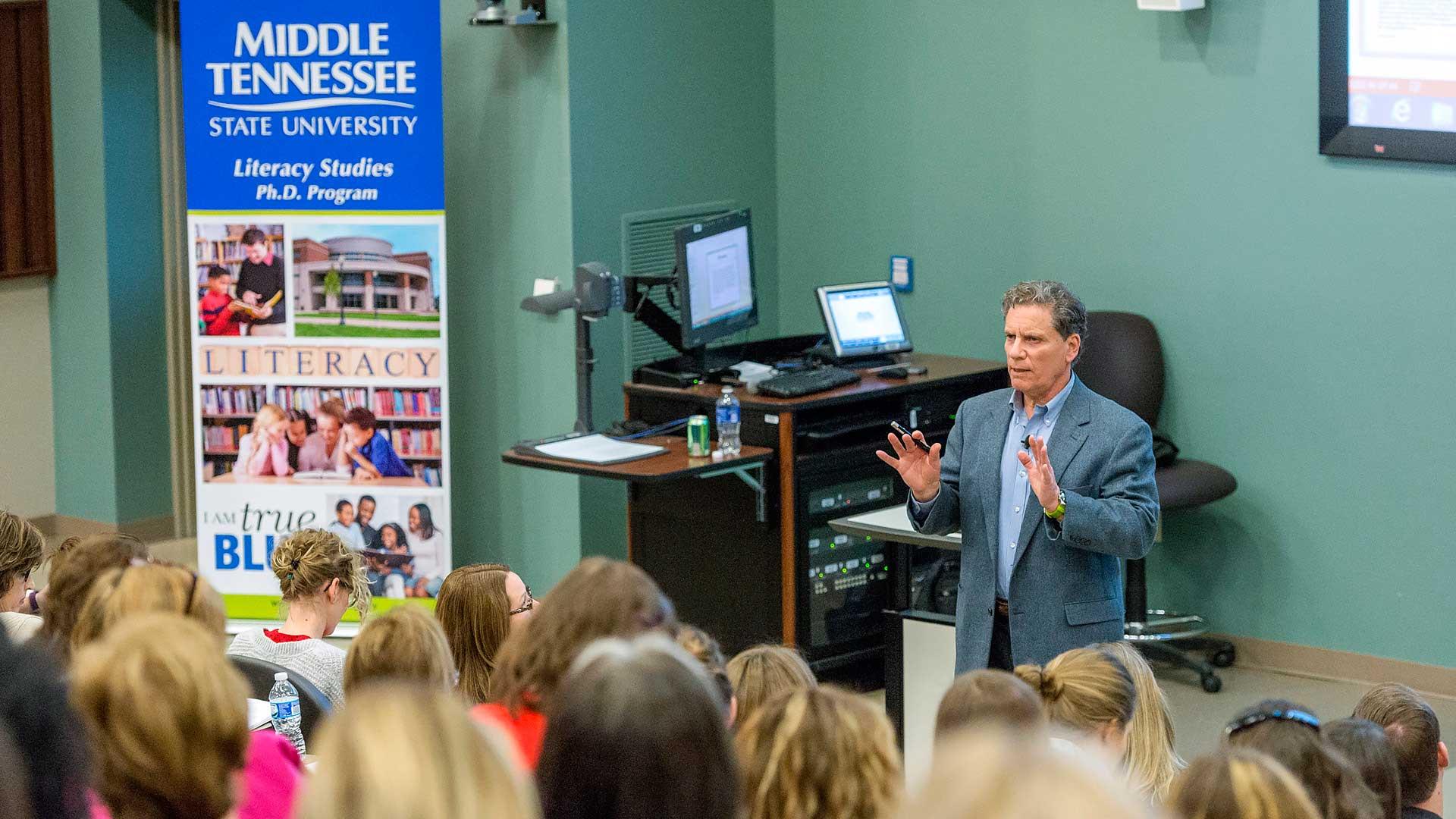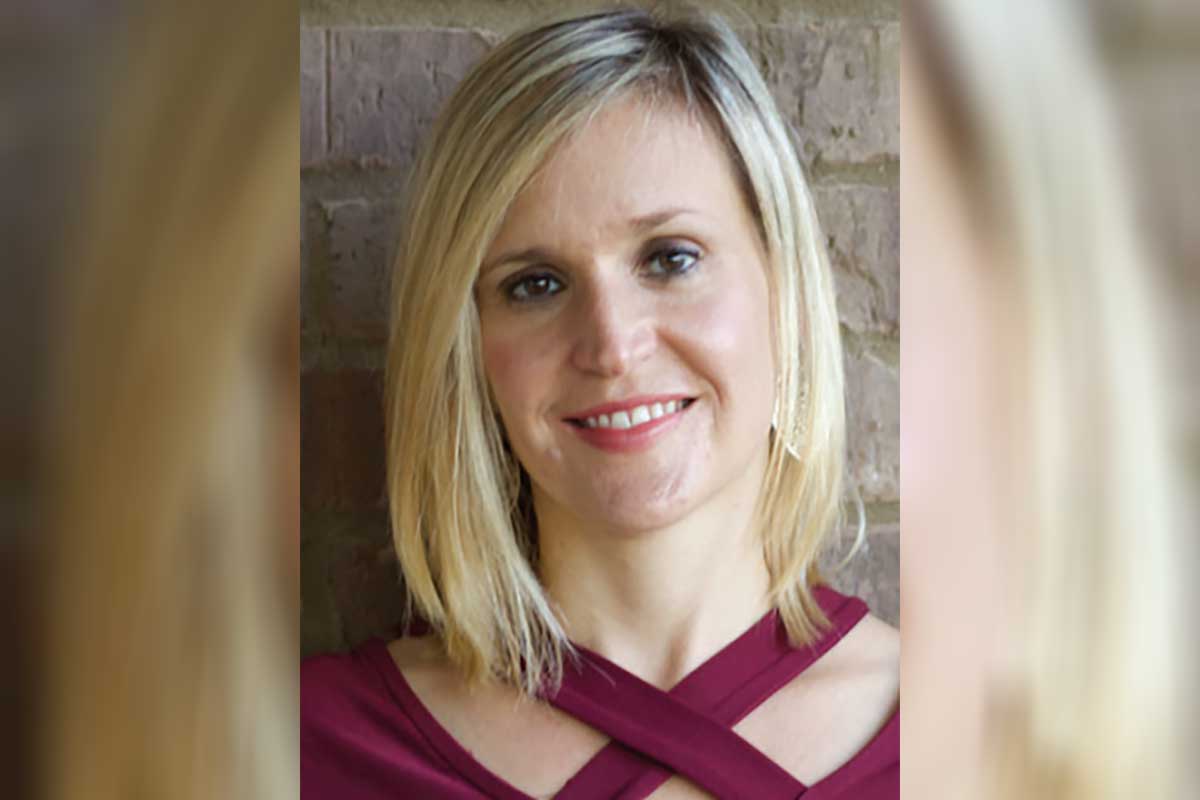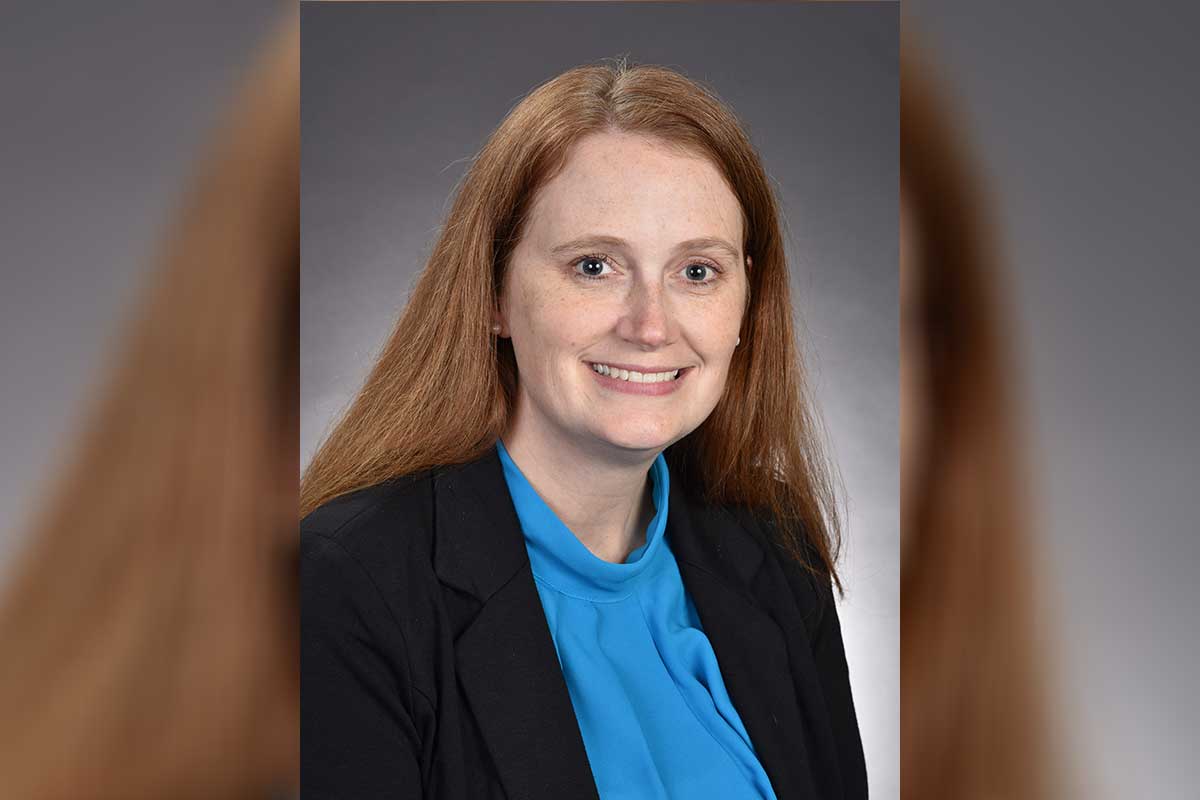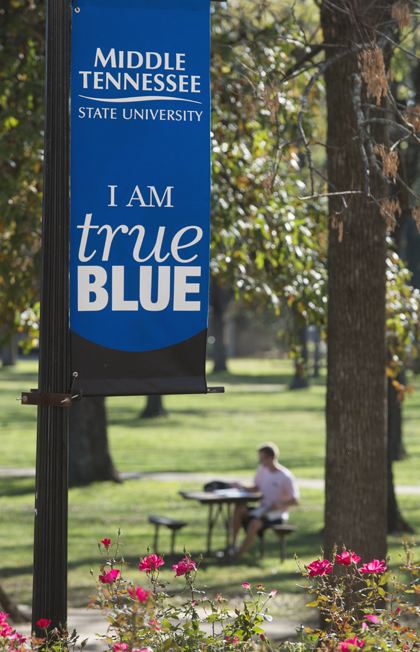
Literacy Studies
Become a literacy leader and bridge research and practice in education. Join us to make an impact.
Literacy Studies, Literacy Instruction and Staff Development Concentration, Ph.D.
The Literacy Instruction and Staff Development concentration of the Literacy Studies Ph.D. Program at Middle Tennessee State University is designed to address one of education's most pressing needs — the shortage of scholars, practitioners, administrators, and policy-makers equipped to bridge the gap between the rapidly expanding body of scientific research on the development of literacy and educational practice, policy, and professional preparation.
This concentration is designed to prepare scholars to serve as teacher educators in university, school, district, and state contexts. Classes in this concentration will lead to specialized knowledge in literacy instruction and professional development. Students may also choose to learn specialized knowledge about multilingual learners in this concentration. Drawing on the faculty from the College of Education, the College of Behavioral and Health Sciences, and the College of Liberal Arts, this interdisciplinary program offers a flexible framework of courses, field experiences, teaching, and research opportunities designed to provide professionals in various spheres of influence with the essential knowledge, skills, and abilities to effectively address literacy challenges in the United States and beyond.
Other Concentrations
News Briefs

Literacy Studies program deepens speech-language pathologist knowledge in field
As a speech-language pathologist (SLP) in the public-school setting, Tammy Hutchings' primary role is to help students communicate more effectively. She credits the knowledge she gained in MTSU's Literacy Studies Ph.D. Program for helping her approach her role as an SLP differently. "The trainings and interactions with experts in the field have deepened my knowledge and awareness. I have learned how language and literacy are intertwined," she said. "Language is the basis of literacy development and a child's literacy growth is dependent upon language. This is something I didn't understand prior to my training in the Literacy Studies program." Hutchings said she also feels more "professionally equipped" with knowledge than ever before. " I dig a little deeper than I did previously. I want to investigate where the breakdown with the language occurs to bring this information to classroom teachers and help develop a plan to improve their ability to comprehend text."

Student co-authors study that finds surprising information about teachers' literacy knowledge
Susan Porter, a student in the Literacy Studies ?Ph.D. Program, recently co-authored a study of educators in a variety of specialties in the primary grades and their literacy knowledge. Classroom teachers, reading interventionists and special educators took a 50-item test to assess that knowledge. Porter said researchers discovered that special educators displayed the lowest level of knowledge, even though they deal with students who have the most severe problems with reading. "Special educators deal with a wide range of students with disabilities, not just academic but also behavioral," Porter said. "So when you're preparing a teacher for special education, there's not a way to know exactly the range of disabilities that they're going to work with, so it's a very broad program."
News Briefs
Literacy Studies program deepens speech-language pathologist knowledge in field

As a speech-language pathologist (SLP) in the public-school setting, Tammy Hutchings' primary role is to help students communicate more effectively. She credits the knowledge she gained in MTSU's Literacy Studies Ph.D. Program for helping her approach her role as an SLP differently. "The trainings and interactions with experts in the field have deepened my knowledge and awareness. I have learned how language and literacy are intertwined," she said. "Language is the basis of literacy development and a child's literacy growth is dependent upon language. This is something I didn't understand prior to my training in the Literacy Studies program." Hutchings said she also feels more "professionally equipped" with knowledge than ever before. " I dig a little deeper than I did previously. I want to investigate where the breakdown with the language occurs to bring this information to classroom teachers and help develop a plan to improve their ability to comprehend text."
Student co-authors study that finds surprising information about teachers' literacy knowledge

Susan Porter, a student in the Literacy Studies ?Ph.D. Program, recently co-authored a study of educators in a variety of specialties in the primary grades and their literacy knowledge. Classroom teachers, reading interventionists and special educators took a 50-item test to assess that knowledge. Porter said researchers discovered that special educators displayed the lowest level of knowledge, even though they deal with students who have the most severe problems with reading. "Special educators deal with a wide range of students with disabilities, not just academic but also behavioral," Porter said. "So when you're preparing a teacher for special education, there's not a way to know exactly the range of disabilities that they're going to work with, so it's a very broad program."
Related Media

Graduates from the Literacy Studies Ph.D. Program may be employed in a variety of
professional positions. Examples include, but are not limited to
- College/university faculty
- Leaders in literacy reform
- Materials/test developers at publishing companies
- Leaders at federal & state education agencies
- Leaders at local districts
- Leaders in non-profit organizations
- Researchers
- School consultants
- Teacher trainers
Employers of MTSU Literacy Studies Ph.D. program alumni include
- Austin Peay State University
- Clarksville-Montgomery County Schools
- Coastal Carolina Community College
- Colorado Department of Education
- Gestalt Community Schools
- Huntsville, Alabama, City Schools
- Lebanon Special School District
- Lipscomb University
- MTSU College of Education
- MTSU Center for the Study & Treatment of Dyslexia
- MTSU James E. Walker Library
- MTSU University Studies
- New Hope Academy
- Rutherford County Schools
- Self-Employed
- Sumner County Schools
- Tennessee Department of Education
- Tullahoma City Schools



Forms
- Course-Based Service Learning Form
- Dissertation Committee Change Form
- Dissertation Guidelines
- Dissertation Proposal Approval Form
- Intent to Graduate and Hooding Form
- Practicum Course Contract
- Practicum Experience Evaluation Form
- Practicum Course Guidelines
- Preliminary Exam Procedure
- Preliminary Exam Registration Form
- Preliminary Exam Rubric & Eval Form
- Program GA Application Form - to be submitted each year
- Residency Contract and Evaluation Form
- Transfer Equivalency Form
- Travel - Graduate Studies Student Travel Application
- Travel - Literacy Studies Ph.D. Program Travel Fund Request Form
Newsletters
- 2022, August
- 2021, August
- 2020, June
- 2019, May
- 2018, November
- 2018, July
- 2017, June
- 2016, May
- 2015, November
- 2015, April
- 2014, September
- 2014, April
- 2013, December
- 2013, September
- 2013, April - Special Issue: First Annual Research-in-Progress Conference
- 2012, December
- 2012, September
- 2012, June
- 2012, March
- 2011, December - Special Issue: A Year in Review
- 2011, November
- 2011, September
Program Handbook
- Program Handbook
- Program Handbook (for students admitted before 2019-2020)
- Program Structure Chart
- Program Structure Chart (prior to Fall 2019)
Graduate Assistantships
The Literacy Studies Ph.D. Program is prepared to supply a limited number of graduate assistantships to qualified applicants. Two types are available: 20-hour and 10-hour. The 20-hour assistantship provides full tuition plus a stipend of $14,500 per year and requires 20 hours of work commitment per week. The 10-hour assistantship pays half tuition plus a stipend of $7,250 per year and requires 10 work hours per week.
Application Process for Graduate Assistantships in Literacy Studies
Applicants wishing to be considered for a graduate assistantship, in addition to supplying the materials for general application (including a general application form), must fill out an application for an assistantship. Graduate Assistantship Application Form
Merit Based Awards
Applications will be awarded by merit. The merit of applications will be judged based on students' grades, GRE scores, letters of reference, availability of students during daytime on campus and skills that students have developed in prior graduate study and professional experience.
Term of Assistantships
Full-time students entering the literacy studies doctorate may apply for up to four years of support through an assistantship. The four year limit is an appropriate amount of time for full-time students to complete a 75-87 hour degree program.
Termination of Assistantships
Students who are awarded an assistantship will typically receive all four years of support, unless their academic performance or performance of duties within the assistantship warrants termination. The MTSU College of Graduate Studies specifies that retaining support is dependent on maintaining a 3.25 cumulative GPA in graduate courses. Graduate assistants found responsible for academic misconduct will have their assistantship terminated.
More information about Graduate Assistantships can be found on the Graduate Studies website.
More Resources
- Education Schools Project
- International Dyslexia Association
- Linguist List
- Mid-South Educational Research Association
- National Center for Education Statistics
- National Council on Teacher Quality
- Society for the Scientific Study of Reading
Student Success
Outstanding Student Award
2022-2023 - Stephanie Wolfe
2021-2022 - Susan B. Porter
2020-2021 – Jessica Dainty and Bingshi Zhang
2019-2020 - Nicole N. Crouch, Jennifer L. Grow and Molly E. Risley
2018-2019 - Natalie M. Griffin, Collin S. Olson and Ping Wang
2017-2018 - Stacy Fields and Qian Wang
2016-2017 - Weon H. Kim and Adam B. Rollins
2015-2016 - Heechun Moon and Summer K. Talbert
2014-2015 - Jennifer L. Cooper and Katie M. Schrodt
2013-2014 - Michelle M. Hasty and Kyungtae Kim
2012-2013 - Casey F. Brasher
2011-2012 - Davonna M. Thomas
2010-2011 - Melissa L. Brock
Dissertations
Claudia Russell – Summer 2024
“The Effects of Critical Feature Handwriting Invention on Early Literacy Skills Acquisition of Pre-K Students”
Dissertation Committee:
Dr. Katie M. Schrodt, Chair
Dr. Amy M. Elleman
Dr. Natalie M. Griffin
Barbara L. Adams – Spring 2023
“Inference Making Skills in Young Learners and Educator Knowledge: Connecting Research to Practice”
Dissertation Committee:
Dr. Eric L. Oslund, Chair
Dr. Amy M. Elleman
Dr. Natalie M. Griffith
Collin S. Olson – Spring 2023
“Do Symbolic Gestures Improve Novel Vocabulary Acquisition for Second Language Learners?”
Dissertation Committee:
Dr. Eric L. Oslund, Chair
Dr. Amy M. Elleman
Dr. Aleka Blackwell
Leticia E. Skae – Spring 2023
“Can Collaborative Professional Development Impact Teachers’ Perceptions of their Self‐Efficacy Beliefs Regarding Vocabulary Instruction?”
Dissertation Committee:
Dr. Eric L. Oslund, Chair
Dr. Amy M. Elleman
Dr. Karen N. Reed
Jessica Dainty - Fall 2022
“Effects Of A Morphological Intervention on the Ability Of 9th and 10th Graders With Disabilities to Read Multisyllabic Derived Words”
Dissertation Committee:
Dr. Timothy N. Odegard, Chair
Dr. Amy M. Elleman
Dr. Eric L. Oslund
Dr. Stuart Bernstein
Susan B. Porter – Fall 2022
“The Diagnostic Accuracy of Three Computer‐Adaptive Screening Measures of Reading”
Dissertation Committee:
Dr. Timothy N. Odegard, Chair
Dr. Amy M. Elleman
Dr. Eric L. Oslund
Dr. Emily Farris
Kimberly S. Bell – Summer 2022
“Examining the Relationships Among Teacher Mindset, Knowledge of Text Complexity, and Text Selection”
Dissertation Committee:
Dr. Amy M. Elleman, Chair
Dr. Eric L. Oslund
Dr. Terri J. Tharp
Tamera L. Hutchings – Summer 2022
“The Influence of Motivational Factors on Reading Comprehension for Elementary School Students with Dyslexia”
Dissertation Committee:
Dr. Timothy N. Odegard, Chair
Dr. Amy M. Elleman
Dr. Eric L. Oslund
Dr. Emily Farris
Bingshi Zhang – Summer 2022
"Differential Influences of Contextual and Affective Factors on Young Adolescent Reading Performance"
Dissertation Committee:
Dr. Amy M. Elleman, Chair
Dr. Jwa K. Kim
Dr. Dana Fuller
Karilena S. Yount – Spring 2022
Dual Language Writing Assessment and Analysis for Upper Elementary Spanish-Speaking English Language Learners
Dissertation Committee:
Dr. Mohammed Albakry, Chair
Dr. Jwa K. Kim
Dr. Stacy Fields
Jessica Abarquez-New - Summer 2021
From Vague Standards to Qualitative Clarity: A Validation Study of the Multicultural Text Selection Rubric
Dissertation Committee:
Dr. Katie Schrodt, Chair
Dr. Jwa K. Kim
Dr. Alicia Pence
Nicole N. Crouch - Summer 2021
The Effect of a Knowledge‐Based Curriculum Using Science Read‐Alouds on Vocabulary, Content, and Listening Comprehension Outcomes with Preschoolers
Dissertation Committee:
Dr. Eric L. Oslund, Chair
Dr. Jwa K. Kim
Dr. Amy M. Elleman
Jennifer François - Summer 2021
Impact of Multimodal Feedback and Formulaic Sequences on Improving Fluency of English Learners on Computer‐Based Speaking Assessments
Dissertation Committee:
Dr. Mohammed Albakry, Chair
Dr. Jwa K. Kim
Dr. Stacy Fields
Ping Wang - Spring 2021
Reader‐test Interactions: An Explanatory Item Response Study on Reading Comprehension
Dissertation Committee:
Dr. Jwa K. Kim, Chair
Dr. Amy M. Elleman
Dr. Eric L. Oslund
Natalie Griffin - Fall 2020
The Impact of Growth Mindset Intervention on Vocabulary, Comprehension, Persistence, and Self‐Perception
Dissertation Committee:
Dr. Amy M. Elleman, Chair
Dr. Jwa K. Kim
Dr. Eric L. Oslund
Masoud Mahmoodi-Shahrebabaki - Fall 2020
The Associations among Literacy Teachers’ Grade Level, Teaching Experience, Work‐family Conflict, Burnout and Turnover Intentions
Dissertation Committee:
Dr. Eric L. Oslund, Chair
Dr. Jwa K. Kim
Dr. Amy M. Elleman
Zheng Peng - Fall 2020
Culture Literacy in College English Textbooks in China: Investigating its Relationship to Students’ Intercultural Competence and Teachers’ Attitudes
Dissertation Committee:
Dr. Mohammed Albakry, Chair
Dr. Jwa K. Kim
Dr. Amy M. Elleman
Qian Wang - Summer 2020
The Impacts of Student-Level and School-Level Factors on Students’ Reading Achievement:
An Application of Hierarchical Linear Modeling
Dissertation Committee:
Dr. Jwa K. Kim, Chair
Dr. Eric L. Oslund
Dr. Amy M. Elleman
Dr. Ying Jin
Tess Fotidzis - Spring 2020
Phonology, Prosody, and Reading Skills: A Mismatch Negativity Experiment
Dissertation Committee:
Dr. Cyrille L. Magne, Chair
Dr. Amy M. Elleman
Dr. Laura A. Barquero
Zahya F. Ahmed - Summer 2019
Impact of Gender and Linguistic Background on English Language Arts Test: Differential Item Functioning
Dissertation Committee:
Dr. Jwa K. Kim, Chair
Dr. Eric L. Oslund
Dr. Amy M. Elleman
Dr. Ying Jin
Victoria M. Gay - Summer 2019
Examining the Effectiveness of a Sentence-Combining Intervention on the Writing Quality of College Freshmen
Dissertation Committee:
Dr. Eric L. Oslund, Chair
Dr. Amy M. Elleman
Dr. Jwa K. Kim
Dr. Charles D. Milligan
K. Melissa McMahan - Summer 2019
Measurement Validation and Exploratory Research: Measuring Teachers' Code Knowledge and Its Association with Dyslexia Therapy Clinical Hours and Confidence to Teach Literacy
Dissertation Committee:
Dr. Jwa K. Kim, Chair
Dr. Eric L. Oslund
Dr. Ying Jin
P. Kelli Wallace - Spring 2019
Teachers' Knowledge and Implementation of Response to Intervention Practices: Graph Literacy and Data-Based Decision Making
Dissertation Committee:
Dr. Eric L. Oslund, Chair
Dr. Amy M. Elleman
Dr. Jwa K. Kim
Summer K. Talbert - Spring 2019
The Relationship of Reading Strategies and Content Knowledge in Models of Integrated Instruction
Dissertation Committee:
Dr. Amy M. Elleman, Chair
Dr. Eric L. Oslund
Dr. Katherine A. Mangione
Timothy S. Nelson - Spring 2019
Building a Corpus-Based Instructional Vocabulary Model: Interdisciplinary Academic Words in University Reading Support Courses
Dissertation Committee:
Dr. Mohammed Albakry, Chair
Dr. Cyrille L. Magne
Dr. Terri J. Tharp
Perry F. Louden - Spring 2019
Morphological Word Chunking Versus Syllable Types: Understanding the Effectiveness of Two Approaches to Polysyllabic Word Reading Instruction for Middle School Struggling Readers
Dissertation Committee:
Dr. Cyrille L. Magne, Chair
Dr. Amy M. Elleman
Dr. Timothy N. Odegard
Daren Li - Spring 2019
Impacts of Socioeconomic and ELL Status on English Language Arts
Dissertation Committee:
Dr. Jwa K. Kim, Co-Chair
Dr. Eric L. Oslund, Co-Chair
Dr. Amy M. Elleman
Dr. Ying Jin
Zachary T. Barnes - Fall 2018
Cognitive Flexibility and Working Memory's Longitudinal Prediction of Reading Achievement
Dissertation Committee:
Dr. Amy M. Elleman, Co-Chair
Dr. Eric L. Oslund, Co-Chair
Dr. Timothy N. Odegard
Dr. Jwa K. Kim
Stacy Fields - Summer 2018
Effects of Adapted Self-Regulated Strategy Development and Focused Vocabulary Instruction for Second Language Adolescents
Dissertation Committee:
Dr. Amy M. Elleman, Chair
Dr. Eric L. Oslund
Dr. Laura Clark
Karen N. Reed - Fall 2017
Empowering School Librarians to be Literacy Instruction Leaders Through Professional Development
Dissertation Committee:
Dr. Eric L. Oslund, Chair
Dr. Amy M. Elleman
Dr. Charles D. Milligan
Dr. Terri J. Tharp
Weon H. Kim - Summer 2017
Application of the IRT and TRT Models to a Reading Comprehension Test
Dissertation Committee:
Dr. Amy M. Elleman, Chair
Dr. Ying Jin
Dr. Mohammed Albakry
Casey Brasher - Spring 2017
Beyond Screening and Progress Monitoring: An Examination of the Reliability and Concurrent Validity of Maze Comprehension Assessments for Fourth-Grade Students
Dissertation Committee:
Dr. Amy M. Elleman, Chair
Dr. Jwa K. Kim
Dr. Aimee Holt
Laura Clark Briggs - Spring 2017
A Comparison of Narrative and Expository Text Comprehension for Students at Varying Levels of SES: A Latent Growth Curve Analysis
Dissertation Committee:
Dr. Jwa K. Kim, Chair
Dr. Amy M. Elleman
Dr. Ying Jin
Sang Hee Jung - Spring 2017
Metrical Stress Sensitivity and Reading Skills in Adults
Dissertation Committee:
Dr. Cyrille L. Magne, Chair
Dr. Amy M. Elleman
Dr. Aleka A. Blackwell
Holly B. Marshall - Spring 2017
The Effectiveness of Readers’ Theatre on Fluency, Comprehension, and Motivation on Primary Students
Dissertation Committee:
Dr. Amy M. Elleman, Chair
Dr. Jwa K. Kim
Dr. Alyson Bass
Dr. Joan Boulware
Melanie Maxwell - Spring 2017
Examining Professional Development and Teacher’s Learning About Literacy Instruction
Dissertation Committee:
Dr. Cyrille L. Magne, Chair
Dr. Terri Tharp
Dr. Joanna Durham-Barnes
Dr. Amy M. Elleman
Andrea Milligan - Spring 2017
A Psychometric Analysis of Teacher-Made Benchmark Assessment in English Language Arts
Dissertation Committee:
Dr. Jwa K. Kim, Chair
Dr. Amy M. Elleman
Dr. Cyrille L. Magne
Joanne Coggins - Summer 2016
Measurement of Morphological Awareness Use of Fourth and Fifth Grade Students with Reading Difficulties
Dissertation Committee:
Dr. Eric Oslund, Chair
Dr. Amy M. Elleman
Dr. Cyrille L. Magne
Heechun Moon - Summer 2016
The Influence of Implicit Speech Rhythm Sensitivity on Reading Comprehension
Dissertation Committee:
Dr. Cyrille L. Magne, Chair
Dr. Amy M. Elleman
Dr. Jwa K. Kim
Jennifer L. Cooper - Spring 2016
Examining Incidental Vocabulary Acquisition by Person- and Item-Level Factors in Secondary Students
Dissertation Committee:
Dr. Amy M. Elleman, Chair
Dr. Jwa K. Kim
Dr. Aleka A. Blackwell
Tyra W. Pickens - Spring 2016
The Impact of Race and Socioeconomic Status on the Reading Comprehension Growth Trajectories of Adolescents
Dissertation Committee:
Dr. Jwa K. Kim, Chair
Dr. Amy M. Elleman
Dr. Eric Oslund
Melissa Stugart - Spring 2016
Common Core State Standards Benchmark Assessments: Item Alignment to the Shifts in Tennessee
Dissertation Committee:
Dr. Jwa K. Kim, Chair
Dr. Amy M. Elleman
Dr. James Herman
Penny S. Thompson - Spring 2015
Scaffolding Emergent Literacy Skills in Pre-Kindergarten through Writing Instruction
Dissertation Committee:
Dr. Amy M. Elleman, Chair
Dr. Jwa K. Kim
Dr. Joanna Durham-Barnes
Dr. Robin Ridgley
Katie M. Schrodt - Spring 2015
The Relationship Among Mindset Instruction, Kindergarteners' Performance, and Motivation in Writer's Workshop
Dissertation Committee:
Dr. Amy M. Elleman, Chair
Dr. Joanna Durham-Barnes
Dr. Jwa K. Kim
Dr. Terri Tharp
Kyungtae Kim - Spring 2015
Model Comparisons Among Testlet Response Theory (TRT) on a Reading Comprehension Test
Dissertation Committee:
Dr. Jwa K. Kim, Chair
Dr. Amy M. Elleman
Dr. Cyrille L. Magne
Melissa L. Brock - Spring 2015
The Relationship between Prosodic Sensitivity at the Discourse Level and Reading Skills: An Electrophysiological Investigation
Dissertation Committee:
Dr. Cyrille L. Magne, Chair
Dr. Aleka A. Blackwell
Dr. Amy M. Elleman
Dr. Jwa K. Kim
Michelle M. Hasty - Spring 2014
How Students’ Critical Engagement with Text and Self-Perceptions as Literate Learners
Can Explain Literacy Performance and Inform Classroom Literacy Practice
Dissertation Committee:
Dr. Cyrille L. Magne, Chair
Dr. Jeanne G. Fain
Dr. Aleka A. Blackwell
Rachel Peay Cornett - Spring 2014
Psychometric Analysis of the Elementary Experience Scale and its Predictability of Elementary Literacy Scores
Dissertation Committee:
Dr. Jwa K. Kim, Chair
Dr. Amy M. Elleman
Dr. James O. Rust
Danica W. Booth - Spring 2014
Scaffolding Content-Area Vocabulary Instruction for English Learners
Dissertation Committee:
Dr. Amy M. Elleman, Chair
Dr. Jwa K. Kim
Dr. Laura Clark
Ling Wang - Fall 2013
The Effects of Single and Dual Coded Multimedia Instructional Methods on Chinese Character Learning
Dissertation Committee:
Dr. Aleka A. Blackwell, Chair
Dr. Jwa K. Kim
Dr. Cyrille Magne
Davonna M. Thomas - Spring 2013
The Effects of Literature Circles on the Reading Achievement of College Reading Students
Dissertation Committee:
Dr. Jeanne Gilliam Fain, Chair
Dr. Aleka Akoyunoglou Blackwell
Dr. Amy M. Elleman
Dr. Jwa K. Kim
Erica Dion Powell - Spring 2013
Predicting College Students’ First Year Success: Should Soft Skills be Taken into Consideration
to More Accurately Predict the Academic Achievement of College Freshmen
Dissertation Committee:
Dr. Amy M. Elleman, Chair
Dr. Jwa K. Kim
Dr. Aleka A. Blackwell
Dr. Jeanne G. Fain
Dr. Charles Milligan
Rachel G. Anderberg - Spring 2013
The Effects of Cross-Age Tutoring on the Reading Achievement of First and Second Grade Students
Dissertation Committee:
Dr. Amy M. Elleman, Chair
Dr. Jwa K. Kim
Dr. Stuart E. Bernstein
Stacey J. Miller - Spring 2012
Literacy Practices as Predictors of Reading Achievement
Dissertation Committee:
Dr. Jeanne G. Fain, Chair
Dr. Dana Fuller
Dr. Cyrille Magne
Danielle Thompson - Summer 2011
Contributions of Prosodic Sensitivity and Morphological Awareness to Word Level Reading:
A Perceptual Task Development Study
Dissertation Committee:
Dr. Jwa K. Kim, Chair
Dr. Stuart Bernstein
Dr. Cyrille Magne
Dr. Dana Fuller

CONTACT US

Please fill in the form below and we will contact you very soon











